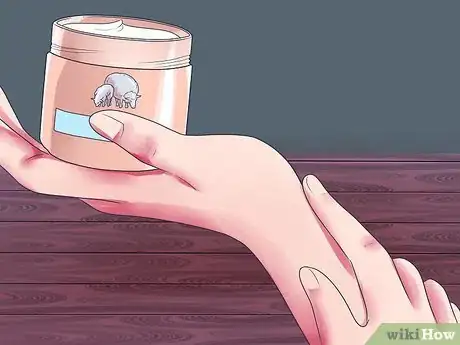This article was co-authored by wikiHow Staff. Our trained team of editors and researchers validate articles for accuracy and comprehensiveness. wikiHow's Content Management Team carefully monitors the work from our editorial staff to ensure that each article is backed by trusted research and meets our high quality standards.
There are 7 references cited in this article, which can be found at the bottom of the page.
This article has been viewed 74,406 times.
Learn more...
Going to class can be tricky under the best of circumstances. Going to school when you’re under the weather can feel like a torturous experience. Everyone will have to attend school when they're sick at least once in their life, so learning how to do it well is important for academic success.
Steps
Making An Effort
-
1Take a shower. It can be hard to motivate yourself to look good when you're feeling ill, but the mental and physical benefits of appearing pulled together cannot be denied. Taking a hot shower or steam is beneficial for cleaning off germs and preventing the spread of bacteria, but the steam can also soften mucus, thus clearing out your nasal cavities and making it easier for you to breathe. [1]
-
2Use moisturizer. As noted above, dehydration is a common side effect in sickness and this applies to your skin as well. Moisturizer can help keep your skin from getting parched and chafing.[2]Advertisement
-
3Apply makeup. Makeup is a great tool to help you look and feel your best and certain products are especially useful in disguising a sick face.
- Use eye drops to help combat red-eye (a common cold side effect.)
- Use waterproof mascara to prevent streaking when your eyes inevitably start watering.
-
4Wear comfortable, bright clothing. Wearing something tight or restricting will cause you to feel even more uncomfortable than you already are, and wearing bright colors will help put you – and others – in a good mood.
Staying Hydrated
-
1Increase your liquid intake. No matter what kind of sickness you’re experiencing, chances are high that your body is undergoing some form of dehydration. Dehydration can cause your mucus to dry up, further clogging your sinuses and causing you to feel even worse than you already do.[3] You’ll know your body is dehydrated if you start feeling thirsty, dizzy or experiencing dry skin or dark yellow urine.[4]
- Fight dehydration by increasing the number of fluids you consume on a daily basis. Focus on drinking more water or other beverages rich in electrolytes.
-
2Eat, even though you don’t want to. Forget what you’ve heard about feeding a cold and starving a fever. Food is important when you’re sick because it provides you with the energy necessary to overcome your illness.
- When sick, try eating soup or broth. If you’re too nauseous to keep the food down, try adding water to dilute the flavor.
-
3Drink herbal tea. Herbal tea is known for its healing properties and certain teas are more adept at fixing certain problems than others.[5]
- Drink Peppermint tea to help with bloating and nausea.
- Drink Ginger tea for assistance with nausea or to ward off a chill.
- Drink Chamomile tea before bed to help get a good night's sleep.
Preparing For The Worst
-
1Medicate responsibly. Colds usually cycle through your body of their own accord, but over-the-counter painkillers can help relieve some of your more annoying symptoms.
- If you’re taking medication, be sure to adhere to the correct dosage and bring extra dosages to school.
- Talk to your pharmacist to make sure you’re not doubling up on certain medications and neglecting others that might bring you much needed relief.
-
2Pack a sick bag to take with you. Make sure to include tissues, cough drops, water bottles or whatever else you might need to stay comfortable in class.
- Do not skimp on tissue quality. Try to use the highest rated product to avoid nose chafing.
- If you forget or run out of supplies, consult your school nurse about obtaining extras.
-
3Alert your teacher. Letting your teacher know before class starts that you are feeling poorly will make it less awkward if you need to get up and use the bathroom unexpectedly.
Distracting Yourself From The Pain
-
1Exercise. The hardest part of suffering through an illness is mental. To take your mind off your discomfort, try engaging in some light exercise. Studies have shown that moderate exercise may help you to feel better when you have a cold.[6]
- Jogging, walking, yoga and dance are good ways to sweat without making yourself sicker.
- Refrain from exercising if your sickness falls below the neck (nausea, diarrhea, dizziness, etc.)
-
2Rest up. Your body relies on sleep to help it fight off whatever infection is currently circulating inside. When you’re sick, sleep often feels impossible, so try using one of these tips to catch up on Z’s:
- Sleep upright, propped up against a pillow. This will allow the fluid drain from your nose and will help you to feel less congested.
- Avoid looking at your phone or other screens in the hour preceding bedtime. Screen time has been shown to make it more difficult for your brain to disengage and relax.
- As noted earlier, try drinking Chamomile tea before bed to help with insomnia.
-
3Smile. A smile, even a forced one, is scientifically proven to make you feel happier and less stressed.[7] So push through the pain and smile. You'll be back to feeling like yourself in no time.
Warnings
- If you start feeling sick during one of your classes, go to the bathroom or see the school nurse.⧼thumbs_response⧽
- Do not over-medicate. Taking more than the recommended dosage can result in stomach bleeding, nausea, and other dangerous health risks.⧼thumbs_response⧽
- If what you have is contagious, do not attend school.⧼thumbs_response⧽
- If you have a temperature over 99 degrees, do not attend school.⧼thumbs_response⧽
- Avoid alcohol at all costs. Alcohol is known to increase dehydration, so staying sober until your sickness has passed is key to ensuring maximum recovery.[8]⧼thumbs_response⧽
Things You'll Need
- Medication
- Tissues
- Moisturizer
- Liquids
- Sleep
References
- ↑ http://www.scientificamerican.com/article/fact-or-fiction-feed-a-cold/
- ↑ http://www.rd.com/health/beauty/secret-beauty-tips-to-look-good-when-youre-sick/
- ↑ http://www.scientificamerican.com/article/fact-or-fiction-feed-a-cold/
- ↑ http://healthyeating.sfgate.com/much-should-water-intake-increase-sick-11266.html
- ↑ http://www.besthealthmag.ca/best-eats/nutrition/7-herbal-teas-that-will-make-you-healthy/
- ↑ http://www.cnn.com/2013/10/10/health/exercising-with-cold-flu/
- ↑ https://www.theatlantic.com/health/archive/2012/07/study-forcing-a-smile-genuinely-decreases-stress/260513/
- ↑ http://www.huffingtonpost.com/2012/12/17/drink-fluids-sick-cold_n_2316690.html








































































